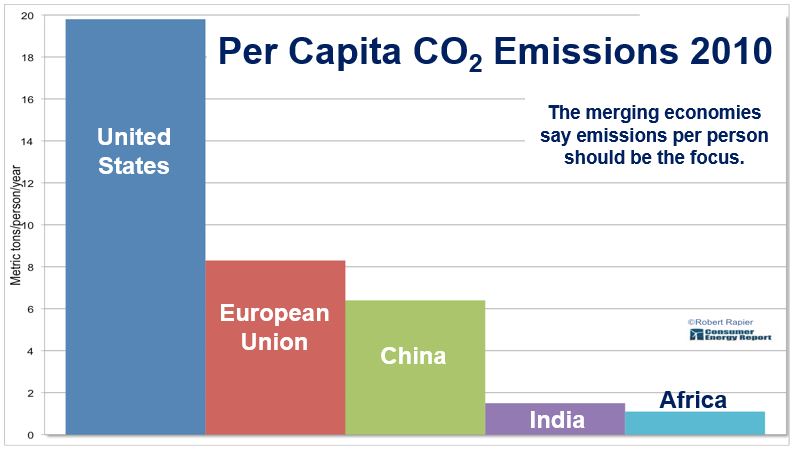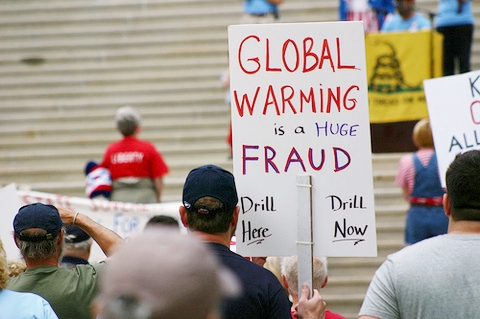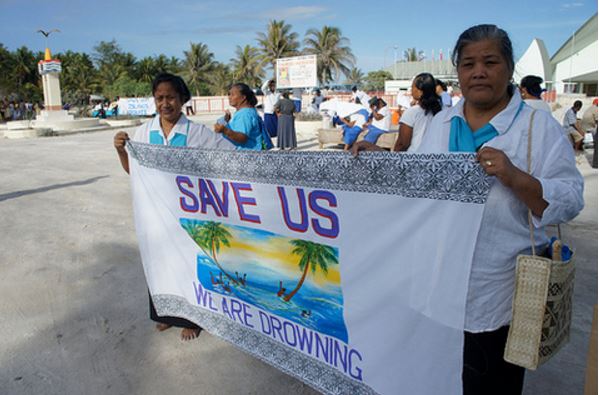The UN Climate Talks have some huge obstacles to overcome before any effective agreement is reached between the leaders and representatives of 180 countries that are participating. They are pushing so many different priorities that predicting a negative outcome is extremely tempting.
The 2015 United Nations Climate Change Conference, also known as COP 21, started on November 30 (today) and will end on December 11. The aim of the conference is to achieve a legally-binding and universal agreement on climate.
The 1997 Kyoto Protocol, when the previous climate treaty was signed, divided the world into the rich and emerging economies, and only required the industrialized nations to reduce their greenhouse emissions.
 Should the focus be on the total emissions of each country or each person? India and China have 40% of the world’s population – any increase from those two countries will have a major impact on the global total (Image: energytrendsinsider.com)
Should the focus be on the total emissions of each country or each person? India and China have 40% of the world’s population – any increase from those two countries will have a major impact on the global total (Image: energytrendsinsider.com)
The European Union, the US, Japan and some other advanced economies say that now everybody should contribute. They add that countries that were classed as ‘developing’ in 1997 have moved upwards, for example, Qatar today has the highest income per capita globally.
However, huge emerging economies, such as China and India, which have become major greenhouse gas emitters, believe it is still the responsibility of the developed nations to reduce their emissions by much more than the less wealthy economies.
The problem is that if China and India do not control their emissions, they will probably represent at least half of all greenhouse gas emissions within the next decade.
Political commentators and economists across the globe say that this issue will be the most difficult one to resolve.
Resources required to reduce emissions
Even if all the countries manage to come to an agreement, several countries are clearly unable to do much without a great deal of help from outside.
In order to switch over to cleaner energy sources, developing economies need technology and money. Setting up wind and solar power infrastructures is not cheap, and requires specialist knowhow and technology.
Developing nations will be asking for money, and lots of it, so that they can adapt to climate change.
The rich countries will probably express solidarity and a willingness to help, but are unlikely to specify with exact figures how deep their pockets are.
We all know that tackling climate change will be a decades-long ordeal – even if all greenhouse gas emissions coming from human activities were brought to a halt today, the problem will continue for several decades.
 Although many Republican voters believe climate change is a myth or scam, the majority (54%), believes it does exist and is a problem, according to the New York Times.
Although many Republican voters believe climate change is a myth or scam, the majority (54%), believes it does exist and is a problem, according to the New York Times.
America comes to the table with its hands tied
Many industrialized and emerging economies, including the European Union, are stressing for the urgent need of a legally-binding agreement.
This will be a serious, and potentially unsurmountable problem for the US representatives, because any legally-binding agreement that places limits on the US will never be approved by Congress, which the Republicans control.
Republican politicians and Republican voters are amongst the populations in the world with the highest percentage of people who believe that climate change (global warming) is a myth.
So, what can the negotiators do? They will probably look for a compromise where some parts of the deal are binding, but emission targets are not. If they manage to get such an accord, President Barack Obama is more likely to get Congress to approve it.
But doesn’t a climate change agreement have to be totally-binding, just like a pregnancy is either that or nothing (you cannot be a bit pregnant)? Wouldn’t a semi-binding deal have no teeth, and therefore a waste of time?
A growing number of people globally (outside of the US) believe an agreement should not be adjusted to the political peculiarities of just one nation.
How do you specify the long-term aims?
A climate-change treaty should have long-term aims clearly specified. Experts and political leaders say this is vital, otherwise nobody will be able to determine how effective it is in the future.
However, defining what the long-term goals are has proven extremely difficult. OPEC nations plus other major oil exporters would be up in arms if any language in the document suggested the phasing out of fossil fuels.
Be prepared to see lots of terms, which will be interpreted in scores of different ways. Terms like ‘decarbonization’, ‘climate neutrality’, or ‘net zero emissions’ will be given new and elastic meanings after teams of lawyers, politicians, statisticians and economists from various political parties and industry lobby groups have done their jobs in explaining them to us.
Helping nations directly affected by climate change
Some island nations, and even larger countries like Bangladesh, say their people are already starting to suffer significantly because of rising seas and changing weather patterns.
 The people of Kiribati – an island republic in the Central Pacific – are threatened by rising sea levels. (Image: davidsuzuki.org)
The people of Kiribati – an island republic in the Central Pacific – are threatened by rising sea levels. (Image: davidsuzuki.org)
They say the Paris agreement must have a mechanism that deals with countries and their people who are damaged.
Rich nations are worried that this issue – known as ‘loss and damage’ – opens the floodgates to enormous claims for compensation and liability from countries and their people affected by climate change events and disasters.
While the small island nations would be reassured with some mention in the Paris agreement of loss and damage, they should not hold their breath – the rich countries will fight tooth and nail to keep that theme out of any text.
Video – What is climate change?
This animation, which is aimed at 6-14 year olds, explains what the basic causes of climate change and its effects are, and how it will impact coral reefs.
